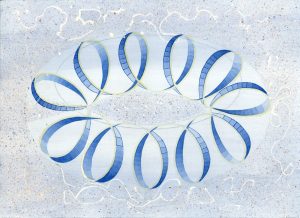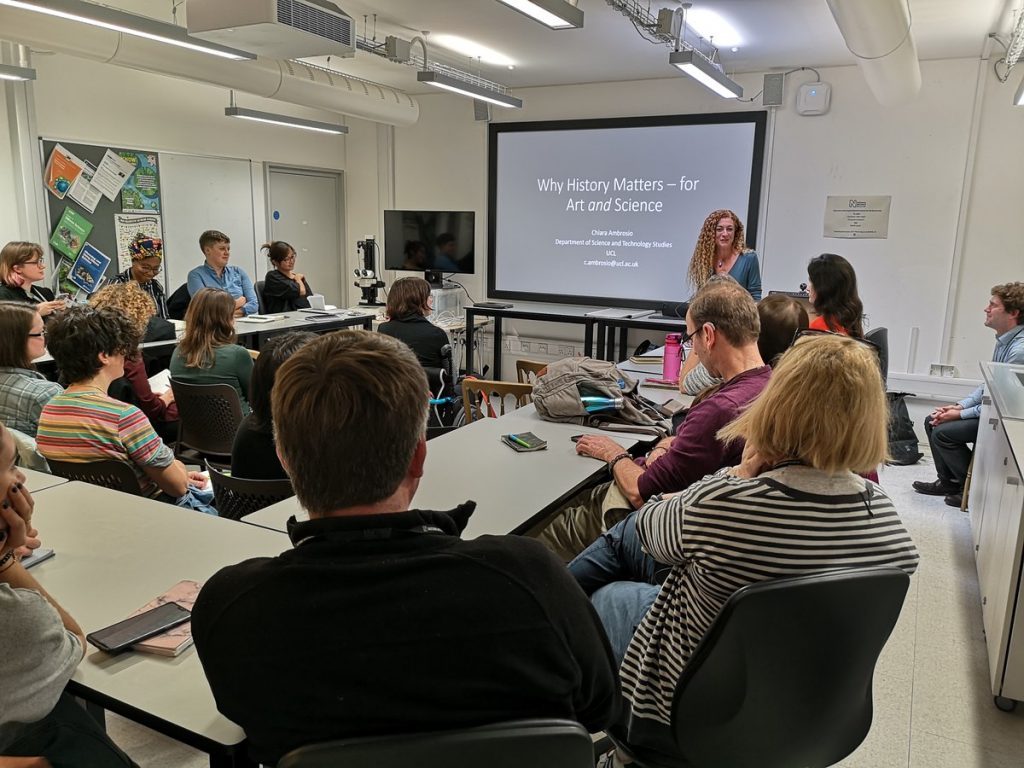You can now download the pdf here
The Guardian Newspaper on And She Built a Crooked House, 19/10/23
Read about And She Built a Crooked House in The Guardian here
The Guardian – 02/12/23 – ‘Shake things up this Christmas: your guide to the best culture for the festive season’
Gemma Anderson-Tempini: And She Built a Crooked House
Burton Grange, Far Headingley, Leeds, to 28 January
With the help of public art maestros ArtAngel, Anderson-Tempini has transformed an empty Victorian house into a family-friendly journey into the fourth dimension, the one beyond the three dimensions we can see. There’s a climbing frame that looks like a giant physics model in the front garden and everything from a seance to a mirrored infinity room can be encountered within.
Full section here
The Guardian – the week in art, 03/11/23
‘A feminist fightback, exploring the fourth dimension and a Greek odyssey’
here
BBC Radio interview about And She Built a Crooked House
Listen to Gemma and Front Row presenter Nick Ahad talking about And She Built a Crooked House on BBC Radio Leeds here (the interview begins at 2 hours 13 mins 30 seconds into the show)
And She Built a Crooked House on the Front page of the Yorkshire Post
Front page of Yorkshire Post Friday 20th October 2023 here
Artangel Project: And She Built a Crooked House
More about the project and booking here
Book Launch
Drawing Processes of Life
Gemma Anderson and John Dupre (University of Exeter)
Egenis book launch
23rd June 2023
3pm-5pm (Drinks during and after)
Hybrid event, register here
Drawing Processes of Life is the product of biologists, philosophers, and artists working together to formulate new ways of representing our new approach to life. It is a mutualistic symbiosis, where identities are transformed, information and nutritive substances shared, and where new organisms emerge.
Exhibition: ‘Of Genes and Human Beings’, Deutsches Hygiene-Museum, Dresden
11. Feb 2023 – 10. Sep 2023
The exhibition ‘Of Genes and Human Beings’ takes a serious and consistent look at the insights gained in science laboratories from the perspective of the social and cultural sciences: with exhibits from everyday life and science, culture and history, the approaches of contemporary art – and with interactive stations that invite us to find out for ourselves who we are and who we might become.
https://www.dhmd.de/en/
Artistic Research Workshop, l’Ecole Média Art du Grand Chalon (EMA) 2023.
14/03/23 – 17/03/23
A three day artistic research workshop contribution to the ‘Visual Worlds’ transdisciplinary research and creation programme at EMA, l’Ecole Média Art du Grand Chalon (Chalon-Sur-Saone, France). The programme focuses on the multiplicity of visual phenomena and the variety of their modes of production and perception, in living beings, within artificial vision systems and in the interactions between them. It is animated by a large number of guests from a variety of fields of knowledge and creation, by a research team composed of young artists and researchers, and will conclude with an international artistic and theoretical restitution in the summer of 2023.
Exhibition: ‘The Botanical Revolution in Contemporary Art’, Kroller-Muller Museum, NL, 2022
In the exhibition Botanischer Wahnsinn, the Kröller-Müller Museum presents a kaleidoscopic selection of works by artists who examine the fascinating world of plants from different perspectives. Botanischer Wahnsinn is divided into five themes: the Scientific plant (process and taxonomy), Ethnobotany (plants for human use, mystical plants and witchcraft), Ideological plants (plants in political, postcolonial an ecofeminist debate), Weeds (good and bad plants), Regeneration and ‘green remediation’ (cleaning contaminated soil with the help of plants). The exhibition includes works in a variety of media, including herbaria, photography, drawings and prints, sculptures and installations by Gemma Anderson, Joseph Beuys, Sjoerd Buisman, Mel Chin, Mark Dion, Ian Hamilton Finlay, Lili Fischer, Pierre Huyghe, Michael Landy, Candice Lin, Ana Mendieta, Otobong Nkanga, Giuseppe Penone, P Staff, Anaïs Tondeur, herman de vries and Lois Weinberger.
https://krollermuller.nl/en/botanischer-wahnsinn-botanical-madness-plant-thinking-in-contemporary-art
New Book: Drawing Processes of Life
Anderson, G. and Dupré, J., (Eds), 2023. Drawing Processes of Life, Intellect Press, OPEN ACCESS BOOK
Contributors:
Gemma Anderson, John Dupré, James Wakefield, Jonathan Phillips, Chiara Ambrosio, Alessio Corti, Heather Barnett, Wahida Khandker, Janina Wellmann, Sarah Gilbert, Scott F. Gilbert, Katharina Lee Chichester, Johannes Jaeger, Berta Verd
Workshop: ‘Relational Process Drawing’
2021 ‘Relational Process Drawing’, ZKM Centre for Art and Media, Karlsruhe, Germany
Living systems are always dynamic at multiple spatial and temporal scales. Their persistence, far from being merely the continued possession of essential properties, is the result of the finely articulated interplay of multiple processes. Representing the dynamic nature of biological processes is a challenge. »Relational process drawing« (Gemma Anderson, 2020) focuses on the dynamic patterns of life and draws together relationships between energy, time, movement and environment. In this workshop, presented by an artist, a philosopher of biology and a cell biologist, we explore ways to represent the entire process of cell division in one connected image through a series of group exploratory drawing exercises.
More info here
Botanical minds: Gina Buenfeld-Murley and Gemma Anderson in conversation with Claudia Tobin
Public Talk – Royal Drawing School, London
Botanical minds: Gina Buenfeld-Murley and Gemma Anderson in conversation with Claudia Tobin
10th March 2021, 7pm: Online with Zoom
Exploring the exhibition ‘The Botanical Mind: Art, Mysticism and the Cosmic Tree‘ at Camden Art Centre, curator Gina Buenfeld and artist and researcher Gemma Anderson discuss the relationship between botanical life, visual art and the imagination with Claudia Tobin. Drawing on indigenous traditions from the Amazon rainforest; alternative perspectives on Western scientific rationalism; and new thinking around plant intelligence, philosophy and cultural theory, the exhibition and its online counterpart investigates the significance of the plant kingdom to human life, consciousness and spirituality across cultures and through time. As the Royal Drawing School develops its sustainable and green drawing programmes, this is an opportunity to discuss different ways of thinking about and understanding plant life through drawing.
Book here
Exhibition – ‘Critical Zones. Observatories for Earthly Politics’, ZKM | Center for Art and Media Karlsruhe
May 9–October 4, 2020
Curated by: Bruno Latour and Peter Weibel with Martin Guinard and Bettina Korintenberg
By now everybody knows that there is an existential threat to our collective conditions of existence, but very few people have any idea of how to cope with this new Critical situation. It is very strange, but citizens of many developed countries are disoriented; it is as if they were asked to land on a new territory, an Earth that they have long ignored having reacted to their action. The hypothesis we want to propose is that the best way to map this new Earth is to see it as a network of Critical Zones, which constitute a thin skin a few kilometers thick that has been generated over eons of time by life forms. Those life forms had completely transformed the original geology of the Earth, before humanity transformed it yet again over the last centuries.
Over the years, scientists have installed multiple Observatories to study these Critical Zones and have made us aware of the complex composition and extreme fragility of this thin layer inside which all life forms, humans included, have to cohabit. They have renewed Earth science in a thousand ways and very much in a way that Alexander von Humboldt would have approved. Increasingly, scientists, artists, activists, politicians, and citizens are realizing that society is not centered solely on humanity, but it has to become Earthly again if it wishes to land without crashing. The modern project has been in flight, unconcerned by planetary limits. Suddenly, there is a general movement toward the soil and new attention to the ways people might inhabit it. Politics is no longer about humans making decisions on their own and for themselves only, but has become an immensely more complex undertaking. New forms of citizenship and new types of attention and care for life forms are required to generate a common ground.
The ZKM thus continues the comprehensive engagement and collaboration with local communities and institutions that was explored during the Open Codes exhibition (2017–2019), opening up a space for common action and discussion to recompose the world we live in: Over a period of five months ZKM will host an exhibition conceived as a scale model to simulate the spatial novelty of this new land as well as the diversity of relations between the life forms inhabiting it. It will serve as an Observatory of Critical Zones allowing visitors to familiarize themselves with the new situation. This special combination of thought experiment and exhibition was developed by Peter Weibel and Bruno Latour in their previous collaborations at ZKM. Iconoclash in 2002, Making Things Public in 2005, and Reset Modernity! in 2016 constitute the three former “thought exhibitions” (Gedankenausstellungen) that resulted from their intensive working relationship which now spans 20 years.
The ZKM website will soon publish the intense program accompanying the exhibition.
More info here
Summer Academy – “Science and Art – Art and Research Today.” Switzerland, August 22-29, 2020
Organised by Hans-Jörg Rheinberger and Staffan Müller-Wille
The theme of the Summer Academy for the Schweizerische Studienstiftung in Magliaso/Ticino from August 22-29, 2020 is “Science and Art – Art and Research Today.” The Studienstiftung supports talented students in all disciplines with bursaries, and the Academy is meant to bring bursary holders together for discussion and socializing at Lake Lugano.
The Summer Academy aims at giving an insight into the actual discursive landscape around the relation between the sciences and the arts. Besides art historians and historians of science, artists and art & science mediators will present their views and projects. The academy will also include a look back onto the development of the relation between the sciences and the arts from the Early Modern period to the first half of the twentieth century (see attachment in German).
I will contribute to the Summer School as an artistic researcher and art mediator giving a lecture on my approach to connecting the sciences and the arts and engaging the participants in practical exercises.
‘The Botanical Mind: Art, Mysticism and the Cosmic Tree’ Exhibition at Camden Arts Centre, London
April 17 – June 21, 2020
This group exhibition investigates the subjectivity and being of plants: their significance to wisdom-traditions, and how we engage with and activate them in culture, counter-culture, art and music. It situates the plant as an axis mundi – the Cosmic Tree – and seeks to reveal through the symbolism of diverse cultural artefacts and in the works of visionary, surrealist, modernist and outsider artists, how the vegetal kingdom has been esteemed with metaphysical importance to the development of consciousness and spirituality.
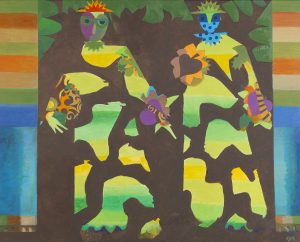
The exhibition brings together an extraordinary presentation of trans-cultural art that reveals an encoded intelligence inherent in plant forms – patterns that can be thought of as blueprints for the natural world. These same patterns relate to ancient metaphysical beliefs shared by diverse cultures globally, manifest in the connected principles of micro- and macro-cosmos, sacred and fractal geometries, and the psychoactive visions induced by mind-manifesting plant medicines.
A major new commission by the Yawanawa people from Acre, Brazil, will celebrate their kene (sacred designs) and music. Passed through ancestral lines, these traditions connect them to the rainforest in which they live and this deeply entwined relationship with plants highlights the way in which music and visual abstraction are active technologies for communicating with a more-than-human world. The exhibition draws a connecting arc to the heritage of a contemporary European worldview, exploring the beliefs that existed before our culture was shaped by the scientific revolution; reappraising the ancestral wisdom traditions that were driven underground by the same colonial values that destroyed indigenous cultures abroad. The modern and contemporary works in the exhibition explore relationships between music and geometric abstraction, mysticism and modernism, psycho-active plant medicines, art and literature of 1960s cultural revolution, and an expanded philosophical and ethical engagement with non-human entities.
More info here
‘Unbounded’ Exhibition at the Eden Project 2019
Unbounded is an exhibition of contemporary art exploring some of the many layers of Cornwall’s social and environmental landscapes. It showcases work by 15 artists, including Gemma Anderson, each working in or deeply connected to Cornwall.
2 November 2019 – 26 January 2020 (open 10am-1pm on 24 December, closed on 25 and 26 December)More info here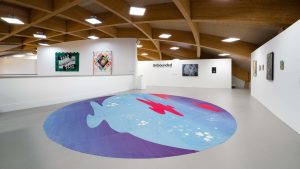
BSDB/Genetics Society meeting 2020
15-18th March, Warwick University
We will present work from our AHRC project ‘Representing Biology as Process’ at the BSDB/Genetics Society meeting 2020
Themes of the conference include: Human Genetics and Development, Evolution of Development, Models of Disease, Regeneration, Gene Regulatory Networks, Signalling and Development, the Genetics of Morphogenesis and Plasticity in Developmental Genetics.
‘Drawing life’
Free Drawing Workshop
Friday, September 13 • 18:00 – 19:30
With pen, pencil and paper, how can we represent the dynamic and constantly moving nature of life?
Led by award-winning artist and research fellow from the University of Exeter, Gemma Anderson, take part in this ‘life’ drawing workshop which offers a novel, creative and collaborative approach to depicting evolution on the page.
When the drawing is constantly evolving, who knows what kind of life will find a way…?
More info here
Drawing workshop at Eden Arts Festival
Free Drawing Workshop exploring plant morphology and process, with Gemma Anderson
at The Eden Project, The Lab,  Core Building
Core Building
15-09-19, 2pm-4pm
More info here
New Article: ‘Dynamic Form’ Published in Antennae Journal of Nature in Visual Culture
Read the article ‘Dynamic Form: Klee as Artist and Morphologist’ by Gemma Anderson via open access here
Abstract:
Guided by the themes of formation and growth in the artist Paul Klee’s work, which resonate with those of my own practice, this essay has developed in parallel with my own progression from an empirical understanding of form as object towards a conceptual understanding of form as process. Here, I advance an original outline of the relationship between Goethe’s concept of morphology and Klee’s art. Central to this is the atypical consideration of certain works by Klee as morphological studies. Following Goethe’s concept of morphology as the study of form and formative process, I interpret Klee’s artistic representation of the dynamic nature of form and, based on particular examples, propose Klee as a morphologist.
Interview – ‘Artistic research: A field where art, science and philosophy meet?’
July, 2019
Read Sophia Efstathiou’s interview with Gemma Anderson – ‘Artistic research: A field where art, science and philosophy meet?’ in the Philosophy of Science in Practice Newsletter here
Representing Protein Dynamics: An interdisciplinary approach
Conference Presentation
The International Society for the History, Philosophy, and Social Studies of Biology (ISHPSSB) Conference 2019: July 7-12, University of Oslo, Norway
Participants
Gemma Anderson, University of Exeter, UK
John Dupre, University of Exeter, UK
Jonathan J. Phillips, University of Exeter, UK
This interdisciplinary conference presentation addresses protein dynamics, beginning with a treatment of the energy landscape associated with protein folding. Here, Anderson is collaborating with protein biophysicist Jonathan Phillips. The conventional image for representing protein dynamics in biology is the “folding funnel”, an irregular, roughly conical shape that corresponds to an energy landscape down which the nascent protein is imagined to transition as its structure achieves lower energy formations. While this image represents some features well, others are obscured. In particular, important aspects of the intrinsic behaviour of molecular species are absent, or poorly represented, such as stochastic change and parallel pathways. Thus, a gap exists in our ability to represent and interact with fundamental dynamic processes in a visual manner that is intuitive and instructive. The proposed presentation at ISHPSSB, Oslo will describe the methods of interdisciplinary collaboration and the objectives of the project, and then present the images developed for protein folding and some discussion of their significance. As with the mitosis project, a number of novel modes of representation are being explored. We will present a series of new images that function as visual metaphors for the protein energy landscape. These draw on the structure of a maze, and we also experiment with the maze as a metaphor for processes beyond proteins, such as mitosis and speciation. Anderson, Phillips and Dupré will jointly present this work, providing philosophical, art-theoretic, and scientific, perspectives on the project and its results.This post is sponsored by our partners Wigs https://www.fakewatch.is/product-category/tag-heuer/monaco/
Artists Residency at Cill Rialaig Project, Ireland
June 2019, Find out more about the project here
Drawing Knowledge
Read the article ‘Drawing Knowledge’ by Fabian Oswold here on the European Molecular Biology Lab’s (EMBL) Newsletter
‘A conversation about art–science collaborations and the importance of drawing in biology…’
eLIFE Podcast
May 2019
Listen to eLIFE podcast discussing our project ‘Representing Biology as Process’ (at 19 mins in) here
‘Philosophy of Biology: Drawing and the dynamic nature of living systems’ in eLIFE
27/03/19 Open access article published in eLIFE:
‘Philosophy of Biology: Drawing and the dynamic nature of living systems’
Article Abstract
Representing the dynamic nature of biological processes is a challenge. This article describes a collaborative project in which the authors – a philosopher of biology, an artist and a cell biologist – explore how best to represent the entire process of cell division in one connected image. This involved a series of group Drawing Labs, one-to-one sessions, and discussions between the authors. The drawings generated during the collaboration were then reviewed by four experts in cell division. We propose that such an approach has value, both in communicating the dynamic nature of biological processes and in generating new insights and hypotheses that can be tested by artists and scientists.
Read article here
About eLIFE:
eLife is a non-profit organisation inspired by research funders and led by scientists. Our mission is to help scientists accelerate discovery by operating a platform for research communication that encourages and recognises the most responsible behaviours in science.eLife publishes work of the highest scientific standards and importance in all areas of the life and biomedical sciences. The research is selected and evaluated by working scientists and is made freely available to all readers without delay.
Research Visit to European Molecular Biology Laboratory
04/03/19- 08/02/19
Research Visit to European Molecular Biology Laboratory (EMBL) in Heidelberg, Germany
I will visit the Leptin Lab at EMBL with Historian of Science Janina Wellmann for one week to study cell formations in gastrulation (early embryogenesis) with specific focus on drawing and movement as modes of enquiry.
Exhibition Talk at the Exchange Gallery
16-02-19

Lively exhibition talk at the Exchange Gallery ranging from music of the spheres and wisdom traditions to to cell division and pluralism- with artist Serena Korda, cell biologist James Wakefield and Camden Arts Centre curator Gina Buenfeld -‘GÄA: Holistic Science and Wisdom Tradition’ is now open!
Art Science Interest Group meeting at the Natural History Museum London
24-01-19

Delighted to have historian of Science Janina Wellmann and Bio-Artist Anna Dumitriu as guest speakers for the first Art Science Interest Group meeting of 2019. Blog post to follow.
*Founded in 2016 by Artist Gemma Anderson and NHM Scientist Gavin Broad, the Art and Science Interest Group (ASIG) at the Natural History Museum is a bi-monthly forum that fosters a community of Scientists and Artists who are interested in the field of ‘Art/Science’. ASIG provides a programme of Invited speakers at each meeting, who share practice and ideas and excite new conversations in the group.
Exhibition – Newlyn Art Gallery and The Exchange, Cornwall
GÄA: HOLISTIC SCIENCE AND WISDOM TRADITION
Gemma Anderson, Serena Korda, Delfina Muñoz de Toro and Abel Rodriguez
16 FEB — 18 MAY 2019
Art/Science Interest Group (ASIG), Natural History Museum
15th November, 2018
Angela Marmont Centre for UK Biodiversity, Natural History Museum, London
Speakers: Dr Chiara Ambrosio (UCL) and artist’s Caroline Ward and Michiko Nitta present their work followed by group discussion.
*Founded in 2016 by Artist Gemma Anderson and NHM Scientist Gavin Broad, the Art and Science Interest Group (ASIG) at the Natural History Museum is a bi-monthly forum that fosters a community of Scientists and Artists who are interested in the field of ‘Art/Science’. ASIG provides a programme of Invited speakers at each meeting, who share practice and ideas and excite new conversations in the group.
Lecture and Workshop at Falmouth School of Art
04/04/19
Lecture about the relationship between process philosophy of biology and artistic processes, based on current AHRC project ‘Representing Biology as Process’
and
Drawing Workshop – ‘Isomorphogenesis, drawing algorithms and symbiosis’: a full day collaborative drawing workshop with FSA BA Drawing students
Society for Philosophy of Science in Practice (SPSP): Representing Biology as Process
Conference Presentation at the Society for Philosophy of Science in Practice: ‘Representing Biology as Process (+Re-presenting Process)’ Alternative format session.
29 June – 2 July 2018
University of Ghent, Ghent, Belgium
Abstract:/\/\/\/\/\/\/\/\/\/
This session developed out of our interdisciplinary project involving an artist (Gemma Anderson), a cell biologist (James Wakefield) and a philosopher (John Dupré). The overall goal of the project is to develop better ways of representing biological processes. It also continues earlier work by Anderson (2017) on drawing as a way of knowing. As Wakefield will argue, the decline of drawing as a practice in biological research has had deleterious consequences for some aspects of biological research.
In the first stages of the project, Anderson and Wakefield have worked together to produce images of mitosis, the process that is the central research topic of the Wakefield lab. The aim was to produce a two-dimensional image that somehow represented the full sequence of transitions involved in mitosis. A method was developed that translated Wakefield’s understanding of mitosis into an image in which the vertical dimension represented time, and a number of features (colour, thickness of line, distance from the centre, etc.) represented crucial aspects of the mitotic process. A number of different images have been generated, representing different organisms with differences in their processes of mitosis. The process of producing these images and its rationale will be presented in fuller detail during the session.
The outcome of this activity has been a series of images, which we refer to—for reasons that will be obvious on seeing them—as mitosis pots. These are, perhaps needless to say, very different from familiar textbook depictions of mitosis. The causal connection between features of mitosis and features of the mitosis pots gives us confidence that the images could be used to represent common features and specific differences in mitosis, though it is also clear that such use would require a degree of training. We shall discuss the costs and benefits of introducing such images into the practice and teaching of biology. Preliminary exploration of this question has involved soliciting reactions from other scientists.
We feel that a standard format of three 30 minute presentation representing distinct disciplinary perspectives would not do justice to the interdisciplinary nature of the project. Instead, we propose three brief introductions to aspects of the project by each of the participants, followed by more detailed presentations of the first completed sub-project, which is collaborative work by Anderson and Wakefield. We will allow some time for discussion at the conclusion of each part of the session. Dupréewill also chair a concluding 15 minute discussion session.
‘Molecules of life: Exploring Proteins through drawing, movement and origami’ – Art/Science/Philosophy Workshop at the Eden Project, Cornwall
28th May 2018
Artist Gemma Anderson, Philosopher John Dupré and Scientist Johnathan Phillips from the University of Exeter, bring an experimental and multi-modal art/science/philosophy workshop ‘Molecules of Life: Exploring Proteins through drawing, movement and origami’ as part of the Eden Project’s Invisible Worlds Launch Week. Please note that you must pre-book a place for the workshop on the afternoon of Monday 28 May. This workshop is part of a packed timetable of science-themed talks and workshop in the Eden Projects brand-new ‘Lab’.
Details of how to book will be added to this page soon.
Society of the Philosophy of Information: Drawing Workshop
Gemma Anderson has been invited by the Society of the Philosophy of Information to create a workshop about ‘drawing information’ at their meeting on the 26th and 27th June 2018 in Brussels.
Gemma Anderson delivers ‘Biology and Art: Investigations through Drawing’ course at Grinnell Liberal Arts College, Iowa, US
‘Biology and Art: Investigations through Drawing’ course at Grinnell Liberal Arts College, Iowa, US
02/04/18-20/04/18
From anatomical studies to the biomorphism of surrealism and the abstractions of Klee and Kandinsky, the biological realm historically provided a significant resource for numerous artists while many scientists like Haeckel and Hooke produced works of artistic merit. This course focuses on the twin themes of morphology and drawing through an exploration of intuitive and experimental drawing methods. The aim is to develop and share new ways in which drawing practice can enhance morphological insight, specifically within the contexts of art and the natural sciences. Central to this is Goethe’s concept of morphology, which he defined in 1792 as ‘the study of form and formative process’ (Goethe and Naydler 1996) combined with a narrative of the development of ‘drawing as a way of knowing’ in my own artistic practice.
The path of the course arcs from observation to abstraction as a range of morphological drawing methods will be tested through a series of practice-based workshops using drawing as a method to investigate in diverse contexts; from fieldwork and microscopy to classification and simulation. We explore the relationship between art and biology through artists, scientists and thinkers such as Goethe, Klee, Waddington, Thistlewood and Mundy. As part of a wider cultural movement in Art/Science and STEAM, this course will highlight historical and contemporary of practices towards the development of independent investigations in Biology and Art.As stated in this article, https://www.fakewatch.is/product-category/rolex/ you can browse your selection of available deals on smartphones and top brands and explore the cell phone service plans that best suit your needs.
Student Reflection:
‘I have left this class with a reinvigorated perspective on Biology and Nature in general. I find myself more attentive to forms and similarities among plants, especially.I also plan to exercise a lot more care and precision with my drawings. Our discussions on bias and our practical exercises on drawing from observation, made me realize just how extremely DIFFICULT it is to accurately capture an organism on paper, and how much skill it takes to be keen at observational drawing, being able to distinguish and incorporate details, patterns, textures, and lines in an unbiased and informative way’.
Gallery Talk at Faulconer Gallery: ‘Representing Biology as Process’
Gallery Talk: Gemma Anderson, ‘Representing Biology as Process’
Faulconer Gallery, Grinnell College, Iowa, US
April 12, 4 p.m.
‘Artist in residence Gemma Anderson will introduce her work at Grinnell in the context of the current collaboration with biologist James Wakefield and philosopher of biology John Dupré on the Arts and Humanities Research Council project Representing Biology as Process (2017-2020). Dr. Anderson has collaborated on a number of innovative art/science projects including Hidden Geometries with the Mathematics Department at Imperial College London; Isomorphology with the Natural History Museum, London; and Portraits: Patients and Psychiatrists (Wellcome Trust Arts Award 2009) in collaboration with psychiatrists and patients at Bethlem Royal Hospital. Co-sponsored by the Institute for Global Engagement and the Biology Department’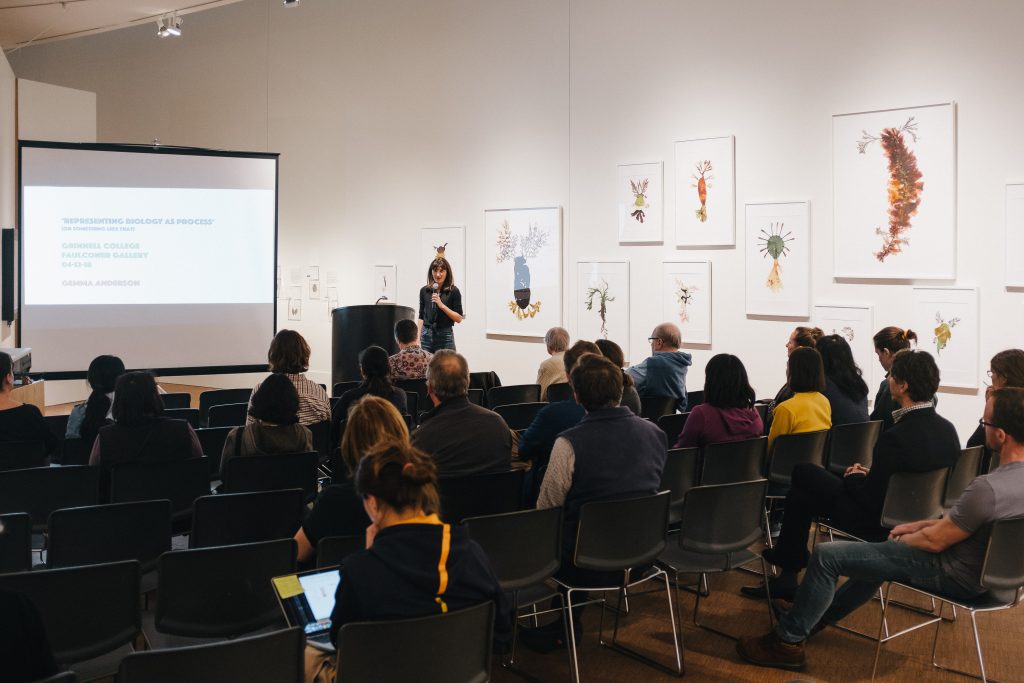 .
.
AHRC grant awarded
The grant application for the project “Representing biology as process” has been awarded funding. The project, based at the University of Exeter, will be led by Prof. John Duprè, with Dr. Gemma Anderson and Prof. James Wakefield as co-investigators. The project will run for three years until 2020.
Updates on the project will be published on the project website www.probioart.uk and The Big Draw website, where it was introduced.
“Growth and Form” Centenary workshop and exhibition in Amsterdam
On-Growth-17On-Growth-17I am co-organising this workshop at Lorentz Center, Snellius, Leiden, Netherlands, Monday 23th – Friday 27th October 2017.

Artist in Residence, Konrad Lorenz Institute (KLI), Vienna, Austria
This first residence opens a collaboration with KLI, an international research centre for the advanced study of theoretical biology in Vienna, that we expect to develop further in 2017.
Keynote lecture at Society for Experimental Biology 2016 conference ‘Creativity in Science Teaching’
‘Beyond Impact: Drawing as a way of knowing in Biological Sciences’, Keynote Lecture, ‘Creativity in Science Teaching’, Society for Experimental Biology, Charles Darwin House, London, 12-14th December.
Northern Ireland Science Festival
Artist talk by first artist-in-residence of the Northern Ireland Science Festival, Gemma Anderson. Gemma talks with Niccolò Tempini, at Naughton Gallery from the exhibition ‘Drawn Investigations from Art and Science’.





